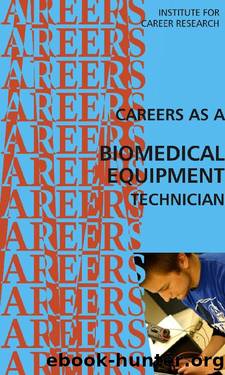Career as a Biomedical Equipment Technician by Institute For Career Research

Author:Institute For Career Research
Language: eng
Format: epub
Publisher: Institute For Career Research
Published: 0101-01-01T00:00:00+00:00
The Professionals Speak
I Repair Patient Related Equipment in a Hospital
âI work in the medical engineering department. I work on a lot of different kinds of equipment, but the most common are vital signs and telemetry monitors, infusion devices, ventilators, and dialysis machines. Most repairs require nothing more than a screwdriver and volt ohm meter. But I also dig into the electronics, troubleshooting circuit boards and replacing components. Most of what I know about electronics, I learned while interning with a clinical engineer. Itâs fascinating stuff and I enjoy updating my knowledge with each new advance in the technology.
This is a fast paced job. I move around the hospital, following through on repair orders as they come in. There are three other technicians in my department and we are all kept busy throughout the day, every day. When I go to work in the morning, I never know what the day will bring. I like that. Itâs never boring and always a challenge. It makes the day whiz by. Sometimes a breakdown happens when a patient is in a critical status. In that case, I have to jump on it and get it fixed stat â that means immediately. That can be stressful, but itâs also very satisfying to be able to take care of it. In a small way, I think of myself as a hero.
A lot of wannabe technicians just want to work with tools and machines. There are some BMET jobs like that, but the hospital environment is different. I work closely with people all day long. I enjoy working with the nurses and occasionally chatting with the patients. You have to be a people person here, and I am.
This is a great job, with good pay and super benefits. My advice to anyone thinking about getting into this field is to jump in sooner rather than later. The need is great and jobs are pretty easy to find. You donât even have to wait until you have a college degree. You can start an internship straight out of high school, but only if you can demonstrate some mechanical aptitude. You do need to make the most of high school. There is a lot of math and science involved in this work so concentrate on those kinds of classes. And do enroll in a training program at your local community college or vocational school as soon as you feel ready. You will need that degree down the road to get certified and pursue advancement. Without it, you will be stuck in a low-level job until you do.â
I Am a Traveling BMET
âA lot of BMETs have to travel. Most just go from facility to facility, installing new equipment or doing routine maintenance. I chose to venture a little farther out. I work for a manufacturer that sends me to countries all over the world, to service their medical equipment wherever it may be. Iâve been to some interesting cities in Europe, but mostly I am needed in third world countries.
Download
This site does not store any files on its server. We only index and link to content provided by other sites. Please contact the content providers to delete copyright contents if any and email us, we'll remove relevant links or contents immediately.
Dynamic Alignment Through Imagery by Eric Franklin(4209)
Body Love by Kelly LeVeque(3053)
Barron's AP Calculus by David Bock(1823)
EMT Exam For Dummies with Online Practice by Arthur Hsieh(1699)
The Juice Lady's Remedies for Asthma and Allergies by Cherie Calbom(1654)
Fitness Walking For Dummies by Liz Neporent(1573)
Extremes: Life, Death and the Limits of the Human Body by Fong Kevin(1529)
Flight by Elephant(1525)
McGraw-Hill Nurses Drug Handbook by Patricia Schull(1500)
The Natural First Aid Handbook by Brigitte Mars(1461)
Tell by Major Margaret Witt(1438)
Skin by Unknown(1419)
Seeing Voices by Oliver Sacks(1415)
The Yoga Bible by Christina Brown(1321)
Born to Walk by James Earls(1310)
Cracking the Nursing Interview by Jim Keogh(1297)
First Aid for Colleges and Universities (10th Edition) by Mistovich Joseph J. & Limmer Daniel J. & Karren Keith J. & Hafen Brent Q(1265)
The Way to Divine Knowledge by William Law(1252)
The Advantage by Lencioni Patrick M(1212)
